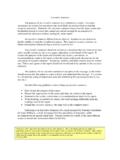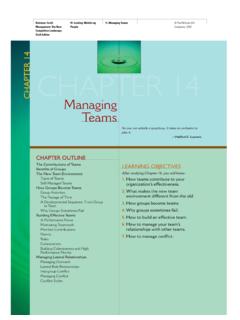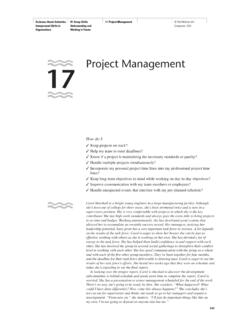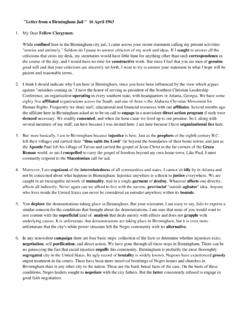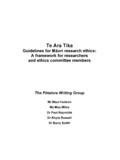Transcription of Conflict: Sources 12 and Solutions - apollolibrary.com
1 DeJanasz Dowd Schneider: Interpersonal Skills in OrganizationsIII. Advanced Interpersonal Skills12. Conflict: Sources and Solutions The McGraw Hill Companies, 2001241 Conflict: Sourcesand SolutionsHow do I: Deal with unresolved anger in a constructive way? Identify the source of conflict as it s occurring? Understand what my natural conflict style is and know which strategy to adoptin a conflict situation? Change my attitude toward conflict and treat it as a normal and potentiallybeneficial part of relationships? Prevent conflict when appropriate? Learn how to manage conflict personally and professionally?I am so angry with my boss I can t even speak to him. We had always been pretty a few years older than me, he was a member of my fraternity when he was incollege. We met at a chapter career networking event. He said I would fit right in at theinvestment bank where he worked and that hired me as I graduated from college.
2 For thefirst few years he was always there for me. I was placed in another department, but hestayed in touch, providing me informally with information and tips. People knew that wewere close, and I have to admit I didn t mind being affiliated with him in people s his stature and reputation at the bank grew, I felt lucky and proud to have been takenunder his wing. Don t get me wrong. I worked hard and earned my promotions on it didn t hurt to be associated with him and to get useful advice from him. At least, notuntil year he was placed in charge of all campus recruiting for the bank. He was thesenior person in charge, and people in all departments who recruited for the bank, likeme, had a dotted line reporting relationship to him for our recruiting results. That s wherethings began to go soon as he was put in charge, he made me his lieutenant. I worked closely with himto ensure his strategic recruiting objectives would be implemented.
3 I began to travelextensively with him and with the other recruiters, line people like myself who had been lent to the function for just one season. It was an honor to be selected. The opportunityto recruit at top-tier campuses is only offered to people who are up and comers at thebank. I was proud of his belief that I could contribute to the effort and do a good the added visibility couldn t hurt when it came time for my next bonus andpromotion. Or could it?One night after our firm s presentation at a top-tier school, he and I ended up theonly recruiters left at the bar from our team of eight. Everyone else had retired for the12 DeJanasz Dowd Schneider: Interpersonal Skills in OrganizationsIII. Advanced Interpersonal Skills12. Conflict: Sources and Solutions The McGraw Hill Companies, 20012423 / Advanced Interpersonal Skillsevening. We were the diehards, left with a group of students who didn t seem to want toleave.
4 I noticed my boss, Bob, over in a corner of the bar with one of the students. Afemale student. Uh-oh. I was worried how this might look and thought I d better saunterover and join in. I got there just in time to hear the student, who sounded like she hadalready had enough to drink, order a drink whose name I hadn t heard since back incollege on spring break in Florida. Bob told the waiter to charge it to his room. He alsopolitely told me to scram. I left, slightly worried about what might be happening butfiguring he knew how to handle make a very long story short, a few weeks later, I found out that Bob had propo-sitioned this student and that she had filed a complaint against him, and by association,against me and our firm s entire recruiting team. Apparently she thinks it was wrong of usto have sent the wrong signal to the students by staying out so late with them. She saysshe stayed because she thought we were interested in her as a potential hire.
5 And that oneof the reasons she didn t get invited back (for an interview the next day) is she refused tosleep with both Bob s job and mine are on the line. Since he s the senior person in charge ofrecruiting and the one who made the pass, he s almost certain to lose his job. And sinceI m his lieutenant, I m vulnerable too. The rest of the team will probably get am so angry I can t even talk to anyone about this. Not him. Not his boss. Not myfiancee. Not human resources. It s humiliating, childish, and shouldn t be involving my hard work at the bank is about to go down the tubes. I m so angry. I thought wewere friends. I thought he would look out for me, not get me in trouble. I don t know whatto do. I just want this all to go away. this a solvable conflict? Why or why not? choosing not to speak to his boss or boss s boss, what impact does this have on theparties involved? options are available, assuming a resolution is desired?
6 The bar scenario might not have been predicted or avoided, in what ways couldthe boss subordinate conflict have been ameliorated before it progressed to this point? role do personal style and comfort with conflict play in our response (andresolution) to situations like these?We re told that conflict is inevitable, that it s part of human nature to have conflicts withothers. Yet seldom do we as human beings get comfortable with conflict. Many of uswould prefer to avoid it at all costs. As we can see from the opening case, avoiding itdoesn t make it go away. It bothers us emotionally whether we confront the source ofthe conflict or not. Managing conflict is one of the toughest yet most rewarding skillsto acquire. Foremost, it is a skill that does not come naturally; it is learned. In thischapter we discuss conflict, what it is, and why learning to manage it is important. Wediscuss common Sources of conflict and present a model for approaching also include strategies and tips for dealing with conflict as well as suggestions forpreventing conflict when possible and for being selective about which conflicts youchoose to tackle.
7 Exercises to help you process and build skills in managing conflict areat the end of the chapter, as is a list of references for further exploration. Speaking without thinking is like shooting without aiming. Ancient ProverbWhat Is Conflict?Conflictis any situation in which there are incompatible goals, cognitions, or emotionswithin or between individuals or groups that lead to opposition or antagonistic Dowd Schneider: Interpersonal Skills in OrganizationsIII. Advanced Interpersonal Skills12. Conflict: Sources and Solutions The McGraw Hill Companies, 200112 / Conflict: Sources and Solutions243 Society s view of conflict and conflict management hasevolved substantially over the last century. These views canbe summarized in three perspectives on managing This view was predominant in the early 20th century whenit was believed that conflict was always bad and should be avoided at all costs.
8 Thisperspective posited that conflict was a result of dysfunctional managerial behaviorand therefore should and could be stopped at the source. Presumably, if the dysfunc-tional behavior was stopped ( , the manager is fired), the conflict would cease to This was the overridin gperspective for the threedecades spannin g1940 throu gh 1970. In this view, conflict was viewed as a naturaland inevitable part of human existence and was accepted as a normal part of groupinteraction and relationships. Sometimes the conflict was functional, other timesdysfunctional, but it was always View The contemporary view holds that not only is conflictinevitable, but maintaining a degree of tension can actually be helpful in keeping agroup energized and creative. In this view, conflict is seen as a positive force for changewithin organizations, groups, and relationships. The challenge is finding constructivemeans for man-aging conflict while still maintaining some differences that energize agroup toward continued discussion and Conflict Normal?
9 It is the struggle between incompatible and opposing needs, wishes, ideas, interests, orpeople. Conflict is a form of interaction among parties who differ in interests, perceptions,goals, values, or approaches to problems. Conflict arises when we begin to feel that theother person is interfering with our ability to attain a certain objective. It begins when webelieve the other party is interfering or standing in the way of an action we want to take, anidea we want to pursue, or a belief we hold. Conflicts may involve individual or groupdisagreements, struggles, disputes, quarrels, or even physical fighting and wars. Becausehuman beings are unique possessing a variety of physical, intellectual, emotional,economic, and social difference conflict is is also a fact of life in all types of organizations. Each organization iscomposed of people, and each person has a set of goals that is likely to be distinct fromthe goals of others in the organization.
10 When individuals with different interests competefor the same resource pool, dissension is sure to tension can be dealt withconstructively, in a way that stimulates creativity and positive change. In fact, lack ofcreative tension sometimes reflects an I don t care attitude that can lead to stagnationon the job. Effective managers are not afraid of conflict. They have been trained to dealwith conflict and have trained their employees to deal with conflict constructively. Theyaccept that conflicts must be faced and strive to find constructive means to manage managers are those who are selective as to which conflicts they choose topursue. Sometimes the best course of action in a difficult situation is to take the pathwith least resistance to be silent!Although managerial mistakes do sometimes cause unnecessary and even unhealthyconflict, it is important to discard the traditional notion that conflict automatically meansone performs ineffectively.

